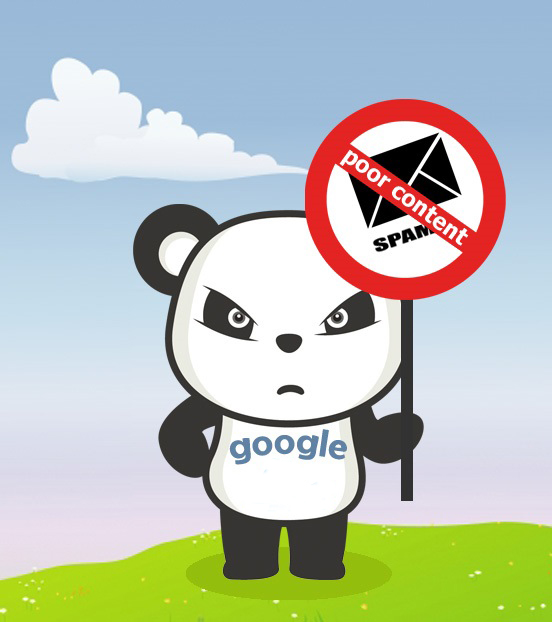Earlier this month there was a ripple in the ranking on Google. Many different markets, and niches started to see fluctuations in sites rankings. We even noticed it with a few of our clients, which was strange as there were many that had been seeing increases and were starting to go in different pages and then back again the next day. Something was up over at the headquarters of Google, and officially they have stated that indeed there has been an update. It’d being dubbed “The Quality Update” which has been added to the algorithm that affects the ranking of your site. What does that mean and can you do anything about it? Well, lets talk about that.
Back in 2011 (4 years ago! Crazy!) there was an update that was released called Google Panda. If you follow Google at all you know they like to have fun interesting names to products and different releases. Panda was released to help clean up the internet. A lot of SEOers, if that’s a term, who wanted to “Game” Google had attempted to build links for their clients pages using methods that really weren’t of any value to the website or user at all besides just being a link. If you visited one of those links you’d more than likely find blog posts, or content that talked about cheese graders and then would flip over to plumbing services all in one section. No relation at all, or real value in the slightest. You wouldn’t find value in content like that, and now Google doesn’t either. From the beginning Google has wanted quality content to its searchers, and Panda was one of their big pushes to make it a reality. Since then many of those “Black Hat” SEOers have disappeared or changed their tactics to follow the guidelines Google has wanted all along.
Those of us who were building quality content started to see better rankings compared to competitors after this update. After doing a happy dance we got back into the swing of things and started working towards fixing those sites that had bad rankings and reestablish them as authority sites in their niches. It’s been a grueling process at times, and Google has continued to launch additional Panda updates as well as others like this Quality Update that was launched earlier this month. Making these changes can be hard for some but it is worth it in the end for all involved. It has brought about a better internet and that trend continues with updates like the one just barely launched.
So you may be wondering what can you do to be sure you have quality content on your website? Good question! Google actually addressed it in a post back in 2011 which is still relevant today. Ask yourself these questions below to see if you are moving in the right direction. Remember if you aren’t following all of these don’t stress! These are to help you get an idea of how Google looks at content and you can start making changes now if you need to:
- Would you trust the information presented in this article?
- Is this article written by an expert or enthusiast who knows the topic well, or is it more shallow in nature?
- Does the site have duplicate, overlapping, or redundant articles on the same or similar topics with slightly different keyword variations?
- Would you be comfortable giving your credit card information to this site?
- Does this article have spelling, stylistic, or factual errors?
- Are the topics driven by genuine interests of readers of the site, or does the site generate content by attempting to guess what might rank well in search engines?
- Does the article provide original content or information, original reporting, original research, or original analysis?
- Does the page provide substantial value when compared to other pages in search results?
- How much quality control is done on content?
- Does the article describe both sides of a story?
- Is the site a recognized authority on its topic?
- Is the content mass-produced by or outsourced to a large number of creators, or spread across a large network of sites, so that individual pages or sites don’t get as much attention or care?
- Was the article edited well, or does it appear sloppy or hastily produced?
- For a health related query, would you trust information from this site?
- Would you recognize this site as an authoritative source when mentioned by name?
- Does this article provide a complete or comprehensive description of the topic?
- Does this article contain insightful analysis or interesting information that is beyond obvious?
- Is this the sort of page you’d want to bookmark, share with a friend, or recommend?
- Does this article have an excessive amount of ads that distract from or interfere with the main content?
- Would you expect to see this article in a printed magazine, encyclopedia or book?
- Are the articles short, unsubstantial, or otherwise lacking in helpful specifics?
- Are the pages produced with great care and attention to detail vs. less attention to detail?
- Would users complain when they see pages from this site?
Phew, so that is a pretty comprehensive list I know, but these items are all good to keep in mind. Google doesn’t want fake content on the internet. They want reputable sources and companies that are honest and real Which you are if you’re reading this blog post! You want to show the world you are a real business with real products and real services! So lets show Google together who you are and let them help you reach your real customers online! If have any questions about this update, Google Panda, or how to better optimize your website. We are here to help! Share your thoughts and comments below.


